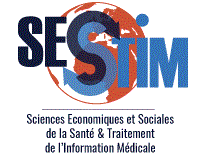A simultaneous assessment of multiple sources of Differential Item Functioning and Response Shift in health-related quality of life of cancer survivors
Résumé
Cancer survivors face much challenges, including physical and mental comorbidities, that affect their health-related quality of life (HRQoL). The cancer experience and the need to adapt may induce Differential Item Functioning (DIF) and Response Shift (RS). The way patients accommodate to their cancer experience may differ according to prognosis group and disease progression, two covariates that may be correlated.
HRQoL of 2009 cancer patients was assessed with SF-12 at two and five years after cancer diagnosis. The twelve cancer types were divided into three prognosis groups (poor, intermediate, and good). Sixteen percent of patients have experienced events related to cancer progression (second cancer, metastasis, cancer treatment or admission to a palliative care unit) between the two times of measurement.
A method assessed simultaneously the two potential sources of DIF and RS based on an extension of the RespOnse Shift Algorithm at the Item level (ROSALI). It was compared to stratified analyses, commonly used in health science, where ROSALI investigated DIF and RS related to one covariate separately in each strata of the other covariate. All methods were applied on the six items of SF-12 physical health (PH) domain assessing the effects of prognosis group and cancer progression.
DIF and/or RS were evidenced on the same four items for all methods but stratified analyses flagged less DIF and RS effects. Mostly, DIF and RS effects were observed regarding limitations in climbing several flights of stairs for all methods in relation with cancer prognosis. Conversely, no DIF or RS effects were observed for limitations in moderate activities suggesting that most intense physical activities are more prone to DIF/RS depending on the type of cancer.
PH decreased on average between 2 and 5 years in case of cancer progression whereas it increased slightly otherwise. The deterioration of PH may be overestimated for patients from the poor prognosis group experiencing cancer progression without adjustment on DIF and RS.
Accounting simultaneously for covariates may provide more insight into the different sources of DIF and RS. However, this strategy of analysis can be limited if groups formed by the covariates are unbalanced.
| Origine | Fichiers produits par l'(les) auteur(s) |
|---|


